Everyone likes feeling fresh! A fresh glass of orange juice. A fresh pair of socks. Feeling fresh in the morning. Fresh is good. But what has fresh got to do with content and SEO? Well…apparently a lot!
The internet and the world wide web has been around for years. In fact, one of the world’s first blogging platforms WordPress has been around since the early 2000’s. It has grown from having 600,000 posts per month to a whopping 85 million posts a month:

And that’s only counting the blogs hosted on WordPress.com – what about the rest of the internet? Just imagine all those videos, photos, social media posts and website content being posted everyday! These days content comes in all shapes and sizes.
There was an old belief that old content does better in rankings compared to new content – But in 2021, is this still correct? After all, who wants to read about some football scores from 10 years ago?
This is where fresh content jumps in and stale content goes away! This post will explain how important fresh content is to SEO and why you should be considering it as part of your content strategy.
What is Fresh Content?
Most people think that fresh content is related to how often you post. Based on this point, a site that posts new content everyday is “fresher” than a site that posts content once a month. This is not entirely correct.
It is true that the easiest way to create fresh content on your site is by posting more often. But true fresh content does not depend on frequency, it depends on the context of the content itself. What?!
Okay, let’s illustrate this point with an example. Take a look at the following two searches:
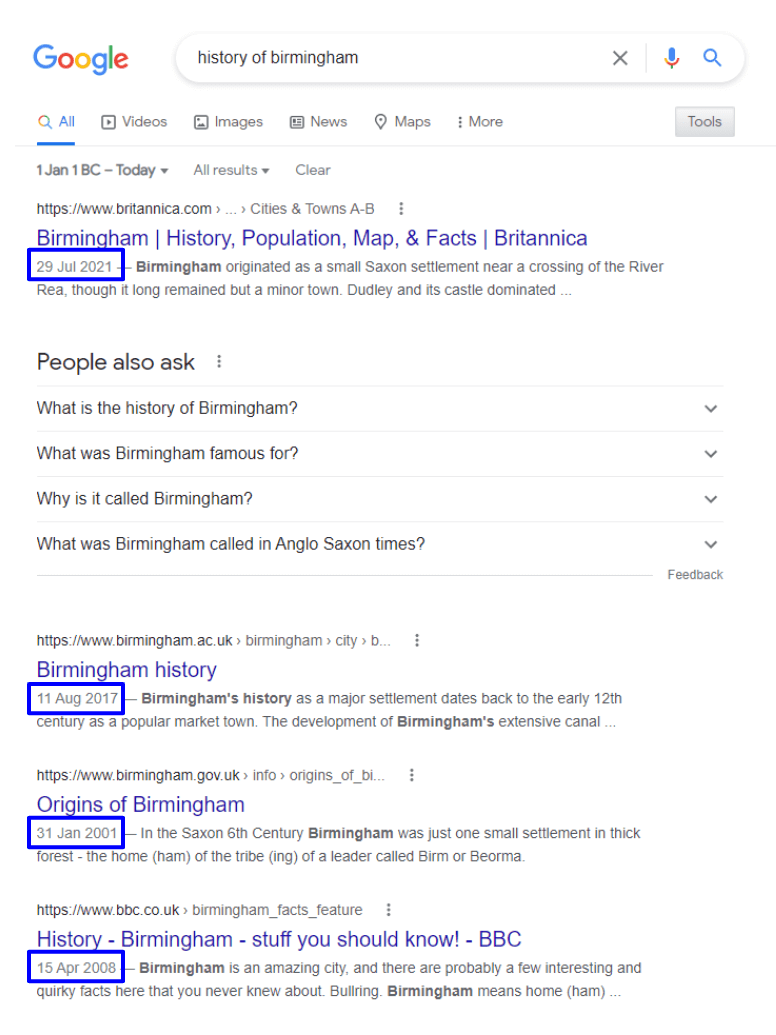
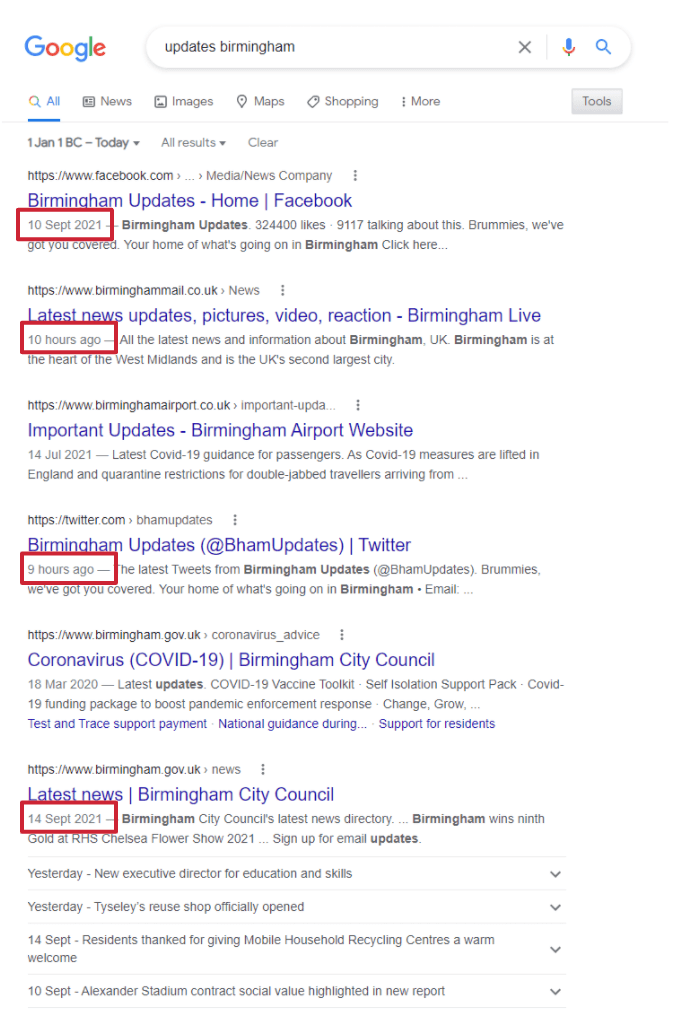
Comparing the two, you can clearly see that the one on the left (“Birmingham History”) contains results dating all the way back to 2001. While the search on the right (“Birmingham Updates”), only dates back to September 2021. So why are the results more up-to-date or “fresh” on the right search query?
Simple, it’s all about searcher intent. There’s four types of searcher or keyword intent: Informational, Investigational, Navigational and transactional. The diagram below shows an example for each type of keyword intent:

According to Matt Cutts, you can add a new intent type to this list, which is freshness:

Here the user is clearly only interested in receiving the latest information about a specific topic. For example the query “Mens Jacket styles 2022”, suggests the user is looking for next year’s big style:
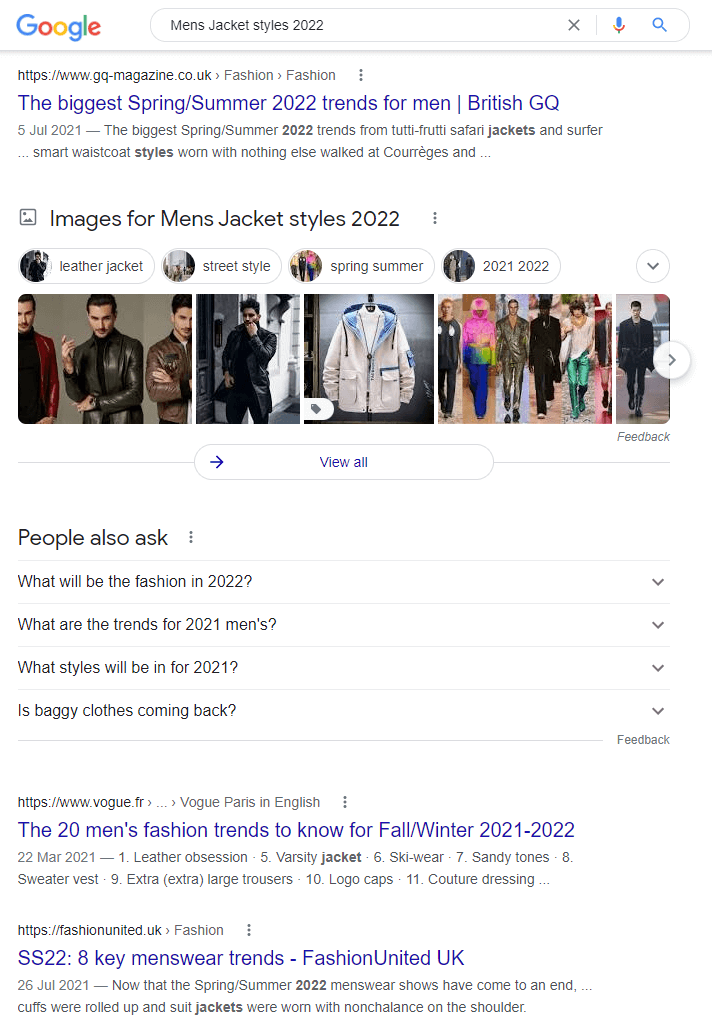
In this case, there is no point in Google showing posts from 10 years ago or even last year! As they will have no relevance to the user.
Therefore going back to our earlier Birmingham example – According to Google’s algorithm (more on this later), the first user would benefit from more historic results if they are looking for the history of Birmingham. However the second user is clearly looking for the latest updates in Birmingham which requires fresh content to fulfil that user’s needs.
What is the link between freshness and frequency?
So why do so many articles link fresh content to frequency of posting? The answer lies in Google’s 2010 Caffeine update. The purpose of this update was to improve the indexing of new pages. This meant that instead of updating their index every couple of weeks, Google was now able to update their index on a continuous basis.
For instance if you post new content on your site every month, then Google will know to crawl your site every month. And if you post your content several times a day, then Google will have to crawl your site several times a day to make sure it is displaying fresh content in it’s search results when requested.
But does this mean that site’s with old, stale content will get penalised? Of course not! As mentioned in the previous section there is a place in the search results for both fresh and old content. Sometimes a user’s query calls for a fresh result, other times a more historic webpage is required.
In fact when it comes to queries that are not dependent on time, the older content normally performs well:
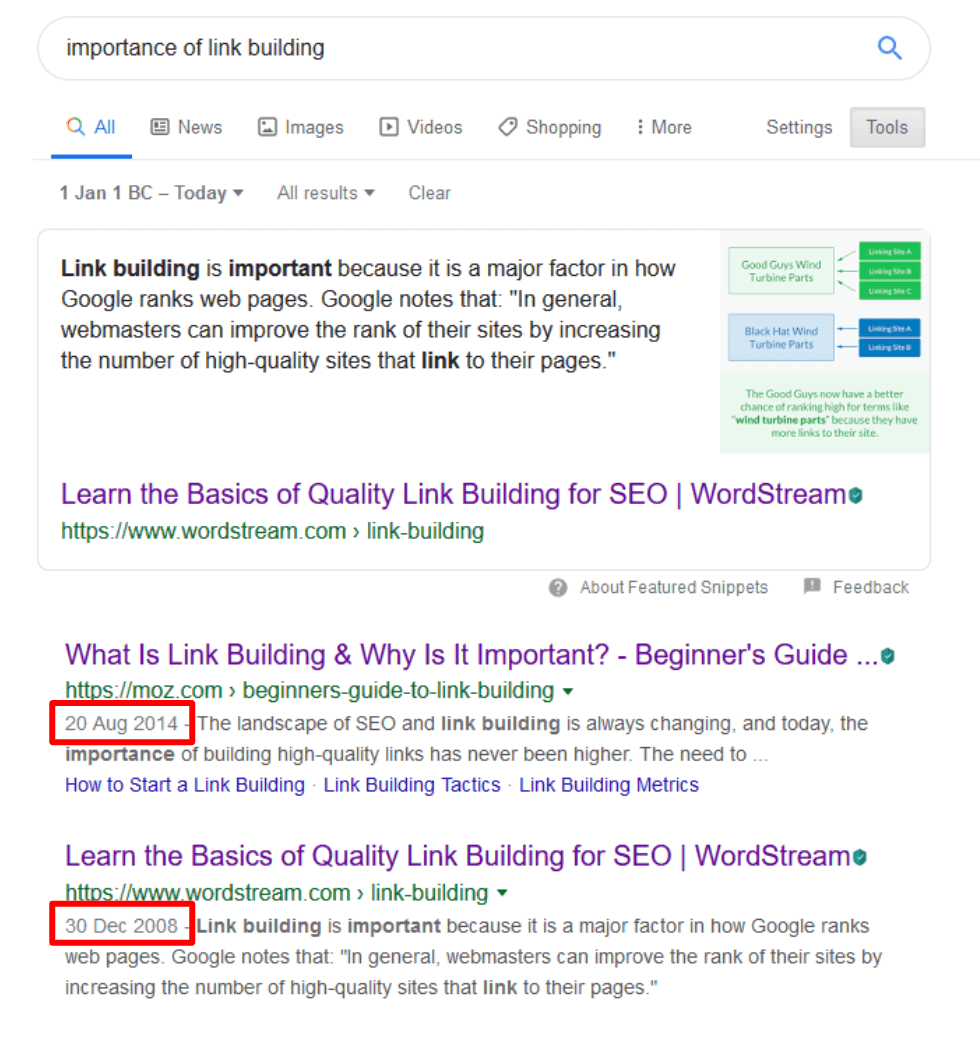
The top two results for this query were published in 2014 and 2008 and still rank high! So you see the Caffeine update focused solely on how pages were indexed and not on how pages should be ranked, as some may mistakenly think.
Is Fresh Content A Ranking Factor?
If creating fresh content doesn’t improve your rankings, then what’s the point of it? A year after the Caffeine update, Google officially announced an update to their ranking system. They clearly specified in their post the type of results that will be affected by this new update:
- Recent events or hot topics: This includes natural disasters or celebrity news like a certain celebrity’s new boyfriend:
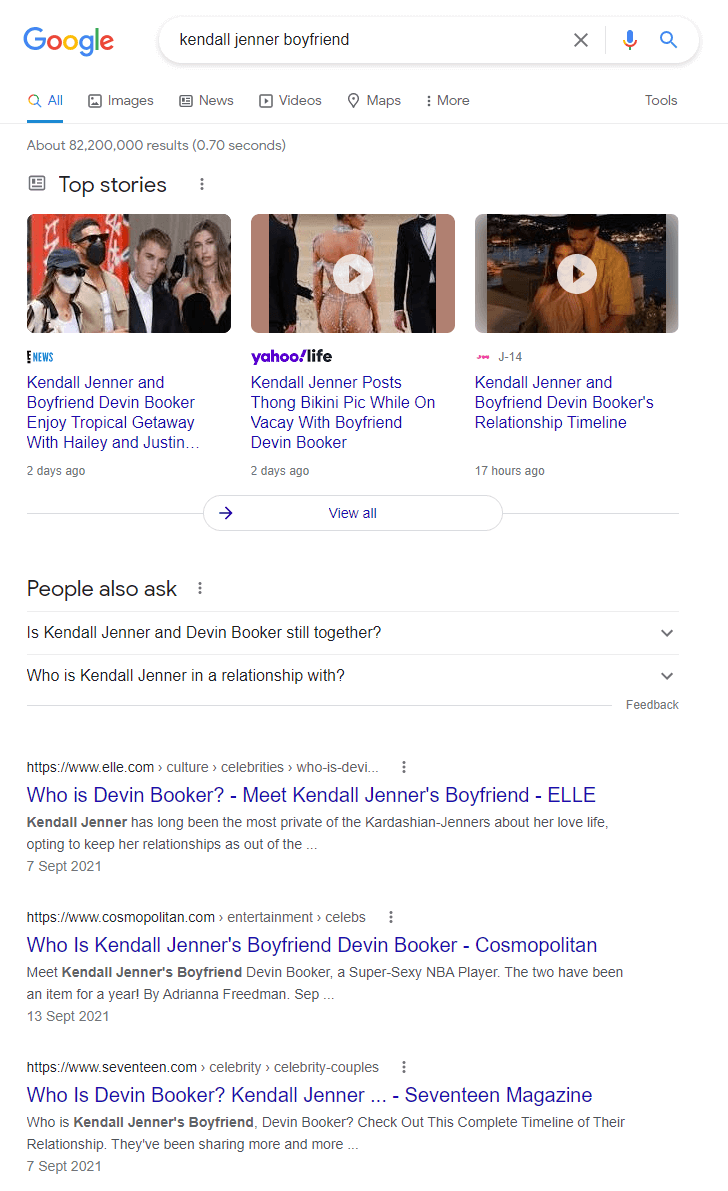
- Regularly recurring events: You might think of a sports event or a big TV show event like Strictly Come Dancing:
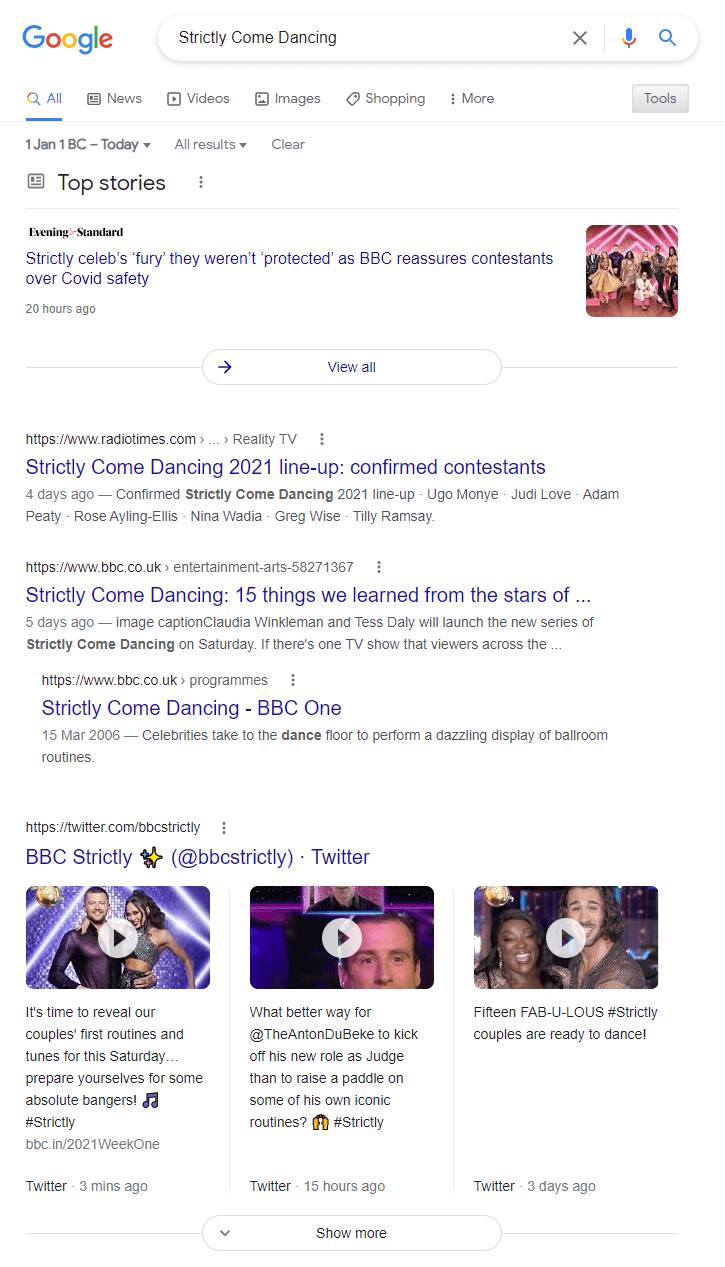
- Frequent updates: This best describes technological updates, such as news on the latest iPhone or the best phone to buy:
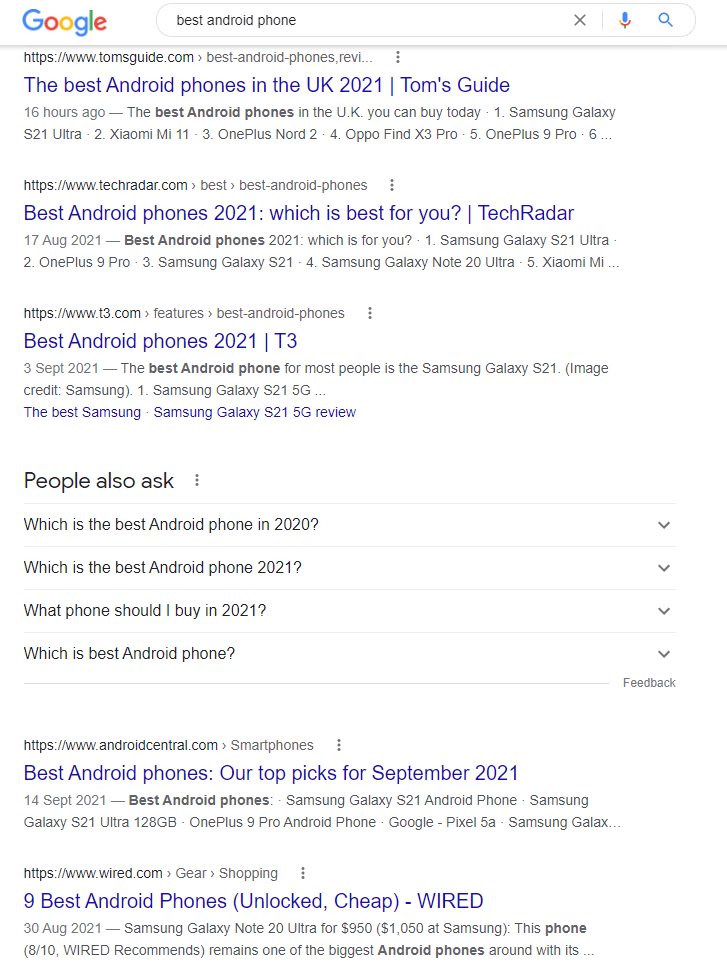
Clearly from the above examples fresh content does impact rankings for certain query types. As Matt Cutts mentioned in his video, these queries can be termed as “QDF” (Queries that deserve freshness). This simply means that only certain query types as mentioned in Google’s announcement will be impacted by Google’s freshness update.
And looking at the above examples, it looks like news sites were mostly impacted by Google’s 2011 freshness update.
How Does Google Determine Freshness?
All this talk on freshness, but how do you actually create fresh content? As noted earlier the biggest misconception with fresh content is that it is based on the publish date. But that’s completely wrong. You can’t keep changing the publish date of your old articles in the hope that this will keep you at the top of the search results – Google is a little smarter than that!
But thankfully there are some things you can do to make your content fresh. According to this article by Cyrus Shepard on Moz, the page’s age or the date of first crawl is a better indicator of freshness. This is for obvious reasons, as the page’s age can’t be faked unlike the last publish date.
He also mentioned that the amount of change can influence freshness for older content on your site. Take this post by Moz on on-page ranking factors as an example. This page was originally published in 2010, but it still ranks at the top in 2021 for the term “SEO best practices”:
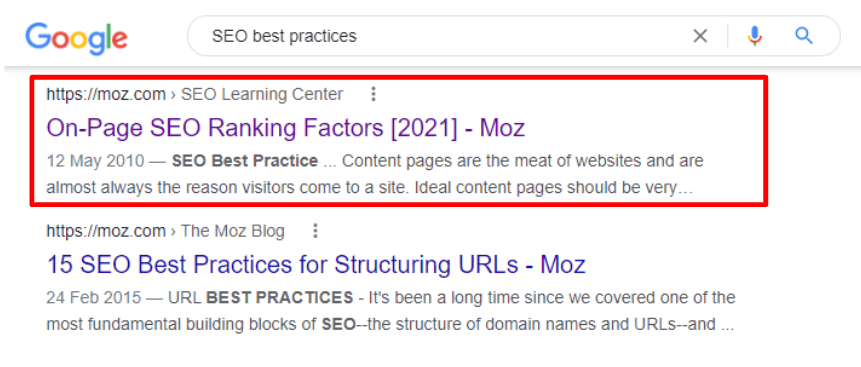
A closer look shows that they have clearly updated the content on this page over the years to keep it fresh and relevant to users. They have also updated the page title tag to encourage more click-throughs from the search results.
Another point to make is the impact of backlinks on your freshness score. We all know that link building is essential to SEO, but did you know that links can also impact your site’s freshness? FreshRank, a term coined by Justin Briggs describes the idea of fresh pages passing on fresh link equity (or freshness score) to pages they link to.
This basically means if you get links from old, stale sites this will dampen the freshness of your page. Alternatively if you get links from active, fresh sites, this will freshen up your page and improve your site’s freshness score. And a fresher page is likely to get indexed quicker and rank higher.
So, is fresh content important for SEO?
We know that fresh content can be confusing, so here’s a summary of the key points from this post:
- Google does favour fresh content for certain query types – So yes to a certain extent fresh content is important, but not always.
- Mostly fresh content has the biggest impact on news sites
- Updating old content is a good way to keep stale content fresh
- Getting fresh backlinks to your page is one of the quickest ways to increase that page’s freshness score.
If you’re looking to create a fresh content strategy for your site or need help with updating your stale content, please contact our team.
